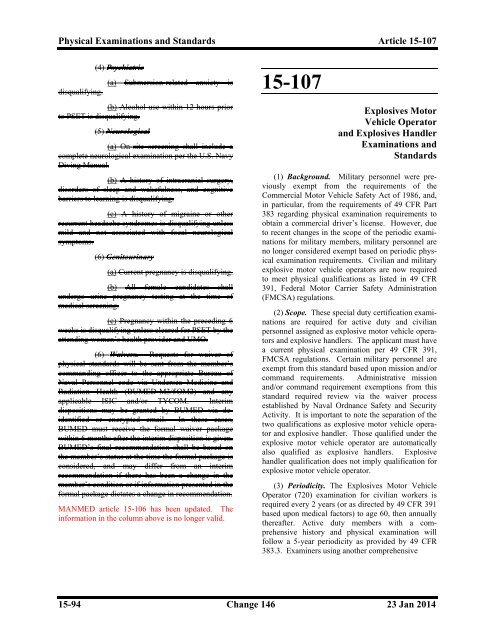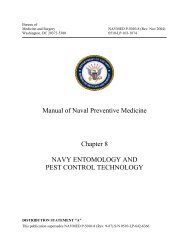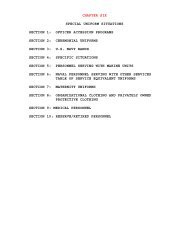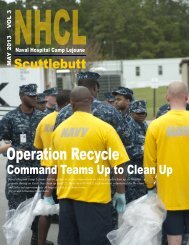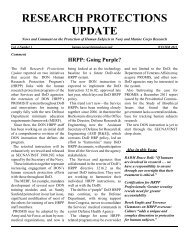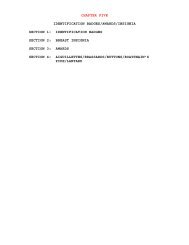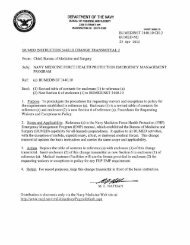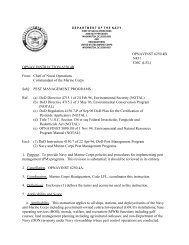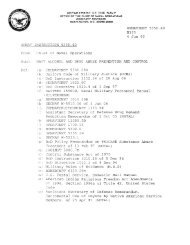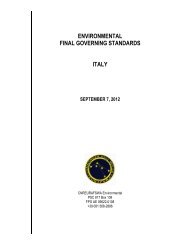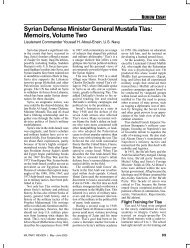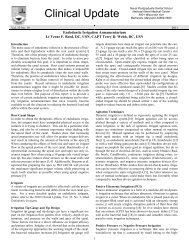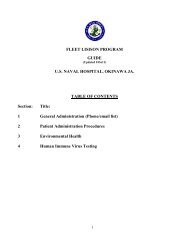Change 146 Manual of the Medical Department ... - Navy Medicine
Change 146 Manual of the Medical Department ... - Navy Medicine
Change 146 Manual of the Medical Department ... - Navy Medicine
You also want an ePaper? Increase the reach of your titles
YUMPU automatically turns print PDFs into web optimized ePapers that Google loves.
Physical Examinations and Standards Article 15-107<br />
disqualifying.<br />
(4) Psychiatric<br />
(a) Submersion-related anxiety is<br />
(b) Alcohol use within 12 hours prior<br />
to PSET is disqualifying.<br />
(5) Neurological<br />
(a) On-site screening shall include a<br />
complete neurological examination per <strong>the</strong> U.S. <strong>Navy</strong><br />
Diving <strong>Manual</strong>.<br />
(b) A history <strong>of</strong> intracranial surgery,<br />
disorders <strong>of</strong> sleep and wakefulness, and cognitive<br />
barriers to learning is disqualifying.<br />
(c) A history <strong>of</strong> migraine or o<strong>the</strong>r<br />
recurrent headache syndromes is disqualifying unless<br />
mild and not associated with focal neurological<br />
symptoms.<br />
(6) Genitourinary<br />
(a) Current pregnancy is disqualifying.<br />
(b) All female candidates shall<br />
undergo urine pregnancy testing at <strong>the</strong> time <strong>of</strong><br />
medical screening.<br />
(c) Pregnancy within <strong>the</strong> preceding 6<br />
weeks is disqualifying unless cleared for PSET by <strong>the</strong><br />
attending women’s health provider and UMO.<br />
(6) Waivers. Requests for waiver <strong>of</strong><br />
physical standards will be sent from <strong>the</strong> member’s<br />
commanding <strong>of</strong>ficer to <strong>the</strong> appropriate Bureau <strong>of</strong><br />
Naval Personnel code via Undersea <strong>Medicine</strong> and<br />
Radiation Health (BUMED-M3/5OM2) and any<br />
applicable ISIC and/or TYCOM. Interim<br />
dispositions may be granted by BUMED via deidentified<br />
or encrypted email. In <strong>the</strong>se cases,<br />
BUMED must receive <strong>the</strong> formal waiver package<br />
within 6 months after <strong>the</strong> interim disposition is given.<br />
BUMED’s final recommendation shall be based on<br />
<strong>the</strong> member’s status at <strong>the</strong> time <strong>the</strong> formal package is<br />
considered, and may differ from an interim<br />
recommendation if <strong>the</strong>re has been a change in <strong>the</strong><br />
member’s condition or if information presented in <strong>the</strong><br />
formal package dictates a change in recommendation.<br />
MANMED article 15-106 has been updated. The<br />
information in <strong>the</strong> column above is no longer valid.<br />
15-107<br />
Explosives Motor<br />
Vehicle Operator<br />
and Explosives Handler<br />
Examinations and<br />
Standards<br />
(1) Background. Military personnel were previously<br />
exempt from <strong>the</strong> requirements <strong>of</strong> <strong>the</strong><br />
Commercial Motor Vehicle Safety Act <strong>of</strong> 1986, and,<br />
in particular, from <strong>the</strong> requirements <strong>of</strong> 49 CFR Part<br />
383 regarding physical examination requirements to<br />
obtain a commercial driver’s license. However, due<br />
to recent changes in <strong>the</strong> scope <strong>of</strong> <strong>the</strong> periodic examinations<br />
for military members, military personnel are<br />
no longer considered exempt based on periodic physical<br />
examination requirements. Civilian and military<br />
explosive motor vehicle operators are now required<br />
to meet physical qualifications as listed in 49 CFR<br />
391, Federal Motor Carrier Safety Administration<br />
(FMCSA) regulations.<br />
(2) Scope. These special duty certification examinations<br />
are required for active duty and civilian<br />
personnel assigned as explosive motor vehicle operators<br />
and explosive handlers. The applicant must have<br />
a current physical examination per 49 CFR 391,<br />
FMCSA regulations. Certain military personnel are<br />
exempt from this standard based upon mission and/or<br />
command requirements. Administrative mission<br />
and/or command requirement exemptions from this<br />
standard required review via <strong>the</strong> waiver process<br />
established by Naval Ordnance Safety and Security<br />
Activity. It is important to note <strong>the</strong> separation <strong>of</strong> <strong>the</strong><br />
two qualifications as explosive motor vehicle operator<br />
and explosive handler. Those qualified under <strong>the</strong><br />
explosive motor vehicle operator are automatically<br />
also qualified as explosive handlers. Explosive<br />
handler qualification does not imply qualification for<br />
explosive motor vehicle operator.<br />
(3) Periodicity. The Explosives Motor Vehicle<br />
Operator (720) examination for civilian workers is<br />
required every 2 years (or as directed by 49 CFR 391<br />
based upon medical factors) to age 60, <strong>the</strong>n annually<br />
<strong>the</strong>reafter. Active duty members with a comprehensive<br />
history and physical examination will<br />
follow a 5-year periodicity as provided by 49 CFR<br />
383.3. Examiners using ano<strong>the</strong>r comprehensive<br />
15-94 <strong>Change</strong> <strong>146</strong> 23 Jan 2014


